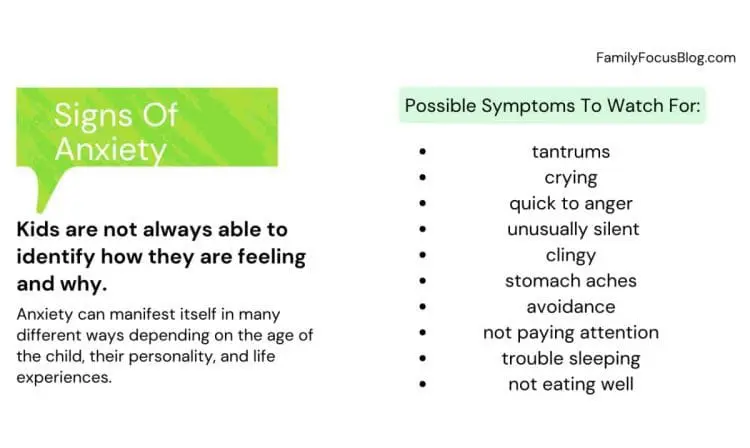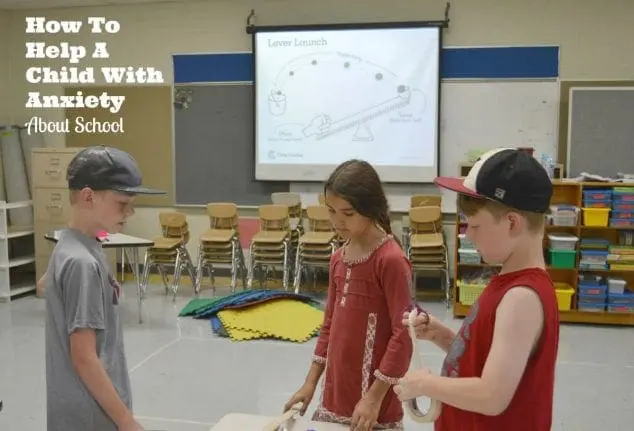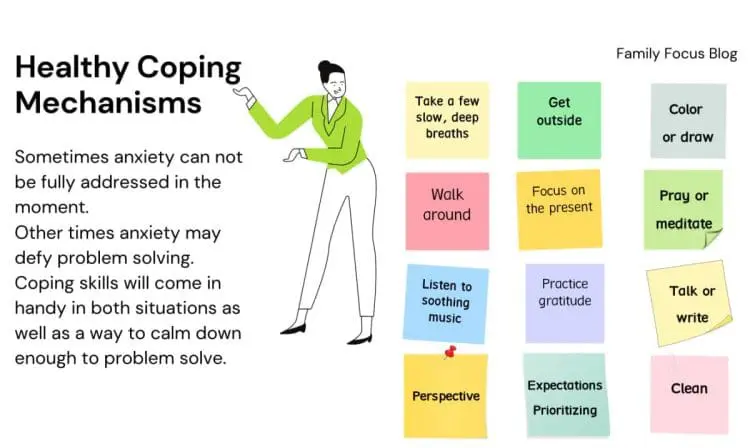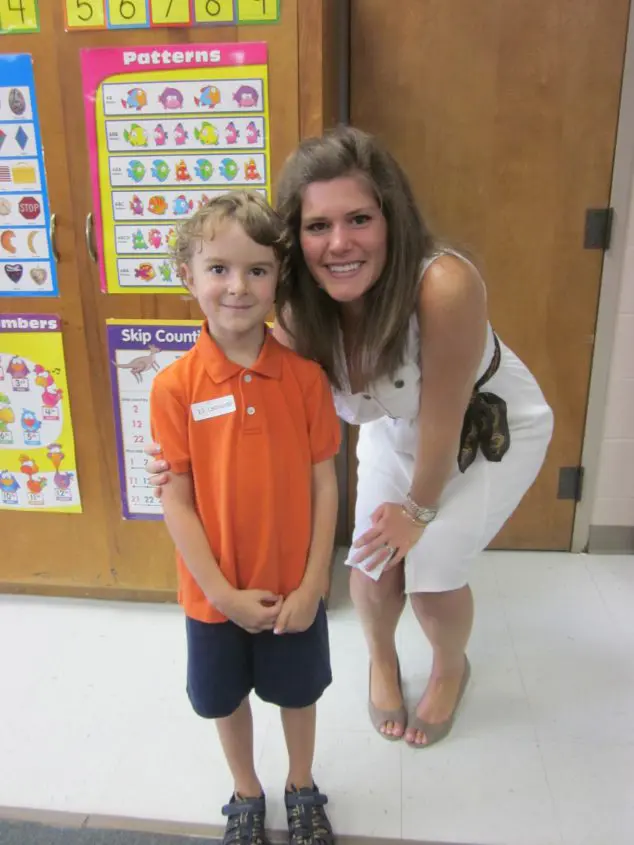Does your child have back-to-school anxiety? If you have a verbal child, they have probably told you how they feel about going back-to-school. However, some kids may not know how to express their anxiety or may be embarrassed to admit that they are nervous about school. Young children often need help identifying their feelings and figuring out the best way to work through them. If you suspect your child is suffering from worry or fear, here are some effective ways identify what they are feeling and to help a child with anxiety.

Symptoms of Anxiety In Children
All children have different experiences, levels of communication skills, and ability and comfort in sharing their feelings. Sometimes a child may not tell you they are anxious about something. After all, they may not even be familiar with what anxiety means. It is defined by Oxford Languages as “a feeling of worry, nervousness, or unease, typically about an imminent event or something with an uncertain outcome.”
In the image above I have shared several signs of anxiety in kids. The tricky part is that sometimes they may seem contradictory. For example, some children may throw a tantrum or behave in a loud, rude way when anxious with others may become silent and distracted. Each person has their own form of expression. As their parent, it is likely you are some what in tune with your child and can at least tell when something is off. Trust your gut, if they seem upset. Reassure them and get them to share how they are feeling. React in a calm, reassuring way. Validate their feelings by explaining it normal to be nervous. But also reassure them that you know they can get through this.
“Anxiety is a universal feeling, and as parents and caregivers, it’s our job to help our children understand what they are feeling, to know that they are not alone, and to show them different ways they can help heal themselves,” says Amanda Bacon-Davis. Here is my Amazon affiliate link to her award-winning book, “This Thing Has A Name,” where she offers guidance to children and their loved-ones, from her personal experience of helping her daughter, to identify, normalize and tame anxiety.
7 Ways To Help An Anxious Child
Don’t take your child’s anxieties personally.
Some parents may dismiss their child’s anxieties while others may take them as a sign of their own failure to do something right. Neither would be fair to yourself or the child. You want to approach their anxieties in a calm, confident manner. Let your child know that it is OK and natural to have anxieties but that you are confident that they will make it through this fine. This is one of the most important ways that you can help a child with anxiety.
Discuss the anxieties when your child is the most relaxed.
You don’t have to talk about your child’s back to school anxieties the second that they surface. If your child expresses their concerns right before bed or when you are rushing out for an appointment, it is OK to let them know you want to discuss this important matter with them and a time when you think it is best to do so. Select a time when your child is rested and full (as well as yourself) for the best chances of a productive conversation with your child.
Start your discussion by letting them tell you their feelings.
In order to help a child with anxiety, it is important to give your child a chance to talk and really listen in order to get to the root of the fears and tell you why they are nervous. It may require some gentle probing questions. Only when you find out what is really bothering them, can you begin to address it.
Anxious children may not always show you their signs of anxiety. It may take a little probing to find out what your child’s fears are.
For example, I asked my son if he was excited for school and he replied, “I don’t know,” in a very unconvinced manner. I let it go and asked the same question later and got the same response so I knew something was up. This time I probed deeper, “Why aren’t you excited?” Again, I got the same, “I don’t know.” I kept probing and got this answer, “I don’t know if I will do as well as my sister.”
Under the impression I had got to the real concern, I immediately assured him that he was smart just like she was. I reminded him of many things he had done well with in Pre-K and listed his talents. He was again unconvinced. So I kept calmly asking questions about why he felt that way in several ways until he unloaded, “But Mommy, I can’t read!” Then I explained that you don’t have to know how to read when you go to kindergarten, that he would learn the beginnings of that in kindergarten. “Oh”, he replied with obvious relief and then he started laughing, “Oh!” he said again. We were both very relieved and he began to get excited after that.
Be understanding but encouraging.
You might say something like this to you child, “Even mommy can be nervous about starting something new. When I started my new job, I wondered if I would like it and if I would like the new people. But then I made up my mind to have a positive attitude and I realized I didn’t need to be afraid. It all turned out fine and you’ll get through this fine too.” In other words, let them know you understand that they are nervous and that concerns are natural but don’t encourage the fears.
Help your child remember past successes.
Remind your child of other times they have successfully come through new experiences and challenges. “Remember when ____. You did just fine with that. I’m sure you will do well with this too.”
Facilitate your children’s problem-solving.
Once you pinpoint their anxiety, help them make a plan to address it. Let them tell you what they think will help and if they can’t think of anything then you might make suggestions. If they are afraid of riding the bus, for example, ask them what they think would help? If they need ideas, offer to tell them about how the route will go, maybe to find a neighbor that can be their buddy or tell them about how it works, call the office for details, etc.
Get Professional Help If Needed
Don’t be afraid to seek the professional help of a doctor or psychologist for your child, if you feel they need it. While anxiety is a perfectly normal emotion, anxiety that involves more than temporary worry or fear and that interferes with daily activities may be a sign of various anxiety disorders. Addressing any mental health issues early with professional cognitive behavioral therapy helps to ameliorate them.

Suggestions For Easing Back-To-School Anxiety
As a first step in addressing anxious feelings, make sure to ask open-ended questions and really listen to the answers as detailed above.
Plan some play date with classmates.
Seeing some familiar faces at school will be a good feeling for them. Try to plan some playdates before school starts. This can help a can help a child with social anxiety prepare for the first time they face a full school day.
Familiarity decreases anxiety.
Plan a tour of your school so they can visit school, play on the playground, walk the halls, find out where the cafeteria is and what the release area is. You will need to talk with the school office to find out how they handle this- each school is different. This familiarization activity will often help reduce your child’s anxiety about the first day of school.
Get into the school schedule early.
Get your kids going to bed on time and waking up early for at least a few days before school starts so they know what to expect. Getting enough sleep will help them be rested enough to meet the challenges of the first few days. Establish a before school and after school routine. You may find this after school checklist handy for the first day of school and establishing a routine.
Make sure your child has a good breakfast and snack.
You will want your child to be full on their first day and not get crabby because they are hungry. It is a good idea to make sure they have a snack ready for right after school too!
On a separate note, if you are dealing with a school refusal or school avoidance from older children, be sure to take that seriously and investigate what is causing these feelings. Is it just an anxious brain or is there a more specific cause such as a certain member or the school staff or social situations they are trying to avoid? If they won’t talk to you the school guidance counselor may be an effective way to get the bottom of things.
General Coping Skills For Kids
Not all anxiety can be reasoned away. That is why it important to have a large tool box when it comes to dealing with anxiety and helping your child find tools that work for them. In the graphic I created below, I share 12 helpful coping skills that will produce a positive outcome and help you overcome instead of avoid the issue.

To help end anxious thoughts, encourage kids to do something that helps them to feel calmer. This could be running, walking, listening to music, painting, drawing or coloring-in, writing in a journal, watching a favorite film or reading a favorite book.
You can count slowly to five as you breathe in, and then five as you breathe out. If this is too much, try starting with shorter counts. If it works for them, gradually encourage your child to breathe out for one or two counts longer than they breathe in, as this can help their body relax.
Here is another coping mechanism you might try with your child- create a mantra. Dr Matthew Lederman is a board-certified Internal Medicine physician and expert in empathetic communication. As a Nonviolent Communication (NVC) practitioner, he recommends mantras one tool parents have available to them saying, “Mantras are positive affirmations or phrases that can be repeated to a child when he or she is feeling anxious. Examples include ‘I am capable and strong,’ or ‘I can handle anything that comes my way.’ This helps regulate the nervous system and create self-connection that stimulates a sense of safety.”
Creating Emotional Resilience For Dealing With Anxiety
Jodi Aman shares some great tips in her video on how to develop emotional resilience for both parents and kids trying to deal with back to school anxiety. She empowers you to become a problem solver so you don’t feel trapped even when faced with tough choices. Enjoy!
Reassure them that the anxiety will pass and that they will be okay. It can be helpful to describe it as a wave that they can ride or surf until it peaks, breaks and gets smaller.
Don’t worry! Take a few deep breaths. The good news is that you and your child will make it through Back-To-School anxiety just fine. You can help a child with anxiety by trying these tips and remembering to stay calm and composed. Just talk with your child in a calm way and brainstorm together about solutions and you will be building a positive framework for your relationship and ability to handle things together at the same time!
Related Posts:
Unique Ways To Be A Better Parent

